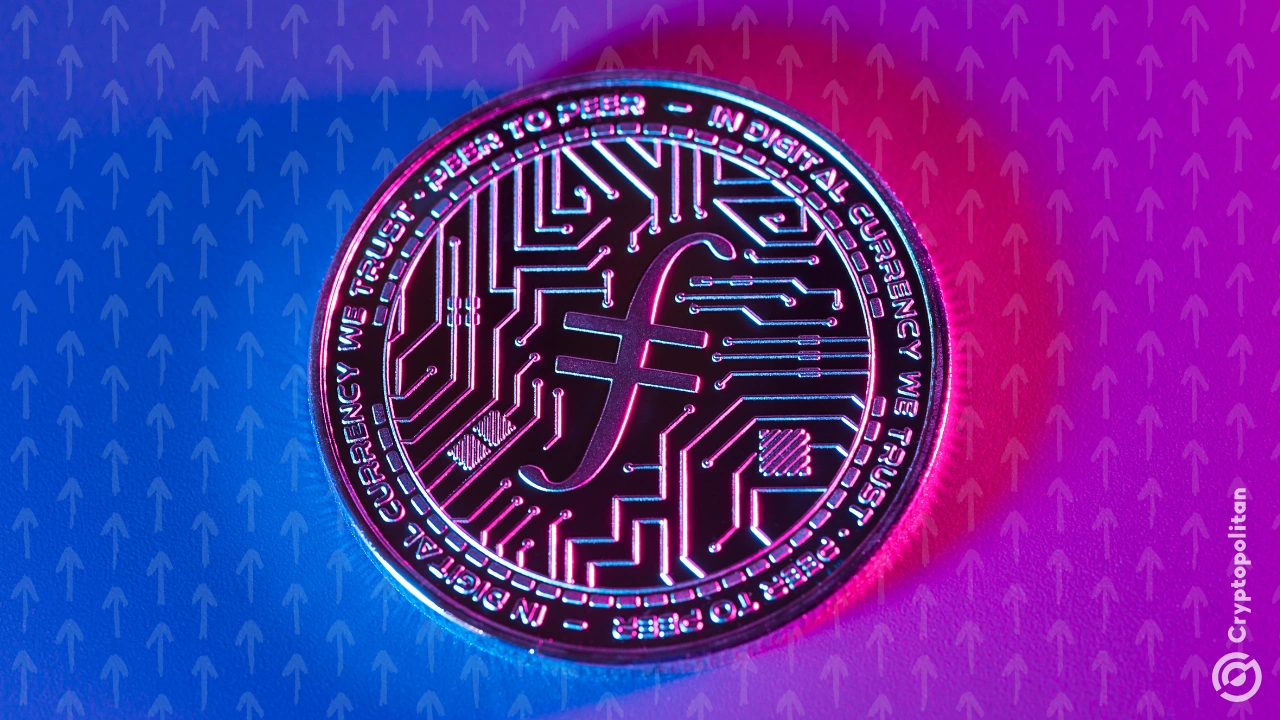Latest Filecoin News

a month ago
Filecoin at a Crossroads: Key Support Level and Market Sentiment
Filecoin (FIL), a prominent player in the decentralized infrastructure sector, is currently navigating a critical phase in its trading journey. As of now, the asset is hovering around a pivotal support level of $3.38, with its short-term trajectory hanging in the balance. Traders are closely monitoring this juncture, as a decisive move could either propel the price upwards or trigger a sharp decline. Recently, Filecoin experienced a modest 0.50% increase in price, accompanied by a notable 16% spike in trading volume, indicating heightened interest from market participants.
Technical analysis reveals that Filecoin has formed an ascending triangle pattern on its four-hour chart, suggesting potential upward movement. However, the asset's ability to maintain its position above the $3.38 support level is crucial. Should it succeed, analysts predict a possible surge of up to 20%, targeting the $4.05 mark. Conversely, if the price dips below $3.30, a decline to $2.92 could be imminent. Additionally, the 200-day Exponential Moving Average indicates a prevailing downtrend, further complicating the market sentiment surrounding FIL.
Despite the bearish outlook, on-chain metrics present a more optimistic scenario. Data shows that intraday traders are favoring long positions, with significant accumulation at the $3.32 level. Furthermore, long-term investors are withdrawing FIL tokens from exchanges, signaling a bullish sentiment and potential buying pressure. As the broader cryptocurrency market grapples with uncertainty, Filecoin's strong fundamentals and increasing adoption in the Decentralized Physical Infrastructure Networks (DePIN) space may provide the resilience needed to navigate this tumultuous period. The coming days will be critical in determining whether Filecoin can maintain its support and initiate a rally or face further declines.

a month ago
DePIN Sector Sees Surge in Social Activity: $TAO Leads the Pack
The DePIN sector has experienced significant growth in social activity over the past twenty-four hours, according to data from Phoenix Group. Leading the charge is the project $TAO, which has garnered attention with 5.7K engaged posts and an impressive 1.5 million interactions. Following closely behind is $ICP, securing the second position with 4.3K engaged posts and 530.5K interactions. The third spot is occupied by $RENDER, which has also seen substantial engagement, with 4.1K posts and 540.4K interactions. Other notable projects include $THETA and Filecoin ($FIL), which have also made their mark in the DePIN landscape.
In addition to the top three, $THETA ranks fourth with 1.6K engaged posts and 147.3K interactions, while Filecoin ($FIL) follows closely with 1.6K posts and 166.2K interactions. $EGLD rounds out the top six with 1.4K engaged posts and 193.8K interactions. The data highlights a vibrant ecosystem within the DePIN sector, showcasing the growing interest and engagement from the community.
At the lower end of the spectrum, $XYO has the least engagement, with only 1.2K posts and 72.1K interactions. Other projects like $HNT and $AKT have also made appearances in the rankings, with $HNT achieving 1.3K posts and 92.9K interactions, while $AKT recorded similar engagement levels. This data underscores the dynamic nature of the DePIN sector, revealing both the leaders and those still striving for greater visibility and interaction in the crypto space.

2 months ago
FXGuys: A Rising Star in the DeFi Landscape
The cryptocurrency market is witnessing a surge in innovation, with FXGuys emerging as a notable contender among high-potential altcoins and DeFi projects. Unlike established players like Filecoin and Hedera, FXGuys combines staking opportunities with a unique prop trading funding program. This innovative approach not only attracts investors but also creates a robust ecosystem for traders, making it a promising alternative in the rapidly evolving crypto landscape.
FXGuys stands out with its unparalleled staking rewards, allowing users to stake $FXG tokens and earn a 20% profit and revenue share from broker trading volumes. This feature positions FXGuys as one of the best DeFi tokens, offering passive income opportunities for its holders. Additionally, the revolutionary Trade2Earn program incentivizes traders by rewarding them with $FXG tokens for every trade executed, fostering increased trading activity and volume. With over $3.9 million raised in its Stage 3 presale, the $FXG token is currently priced at $0.05, reflecting strong investor interest and potential for growth.
What sets FXGuys apart from its competitors is its commitment to accessibility and convenience for traders. The platform supports multiple trading platforms, including MT5 and cTrader, and offers same-day deposits and withdrawals in over 100 local currencies. Furthermore, FXGuys eliminates barriers such as buy/sell taxes on $FXG and KYC requirements for decentralized trading, making it an attractive option for both seasoned traders and newcomers. As FXGuys continues to gain traction, its unique offerings position it as a leading player in the DeFi space, poised for significant growth in the coming months.

2 months ago
Emerging Trends in Cryptocurrency: Cardano, Filecoin, and Web3Bay
In the ever-evolving landscape of cryptocurrency, certain projects are demonstrating remarkable resilience and growth, while others struggle to maintain relevance. Recent updates highlight Cardano's impressive price growth, which surged by 12% over the past week, despite a slight dip to $1.064. This upward momentum is attributed to the network's innovative upgrades, particularly in on-chain governance, which enhance its scalability and utility. Furthermore, the addition of Cardano to Robinhood Markets has broadened its accessibility for U.S. traders, reinforcing its position as a significant player in the blockchain ecosystem. Analysts are optimistic, projecting that if current trends continue, ADA could reach as high as $6, making it a key asset to monitor in 2025.
On another front, Filecoin is solidifying its dominance in the decentralized physical infrastructure networks (DePIN) sector with strategic advancements in decentralized storage solutions. The recent "nv23" upgrade, dubbed Waffle, has significantly improved performance and interoperability with Ethereum, paving the way for new cross-chain integrations. Additionally, Filecoin's collaboration with SingularityNET aims to revolutionize AI model training by utilizing secure and decentralized storage. These developments not only enhance Filecoin's utility within the Web3 infrastructure but also attract developers and enterprises, positioning it as a leader in the decentralized storage space.
Amidst these established players, a new contender, Web3Bay, is emerging with the ambition to redefine the $5 trillion e-commerce industry through blockchain innovation. By eliminating intermediaries, Web3Bay promises a transparent and user-friendly shopping experience, rewarding participants with its 3BAY token. With $830,000 raised in its presale and features like NFT marketplaces and DeFi staking on the horizon, Web3Bay presents a compelling opportunity for investors seeking long-term growth in the Web3 space. As the presale progresses, early participants could see substantial returns, making this an exciting time for those looking to invest in the future of decentralized e-commerce.

2 months ago
Top Four Web3 Altcoins to Watch for 2025
In the competitive landscape of cryptocurrencies, discerning traders are increasingly focusing on Web3 altcoins that promise substantial returns through innovation and practical applications. This article highlights four standout altcoins: Web3Bay, Chainlink, Filecoin, and Stacks, each offering unique features that cater to the evolving needs of investors. Web3Bay, for instance, is revolutionizing e-commerce with its first-layer blockchain technology, enabling enhanced transparency and user autonomy. Currently in its third presale stage, the 3BAY token is priced at $0.0039675, with a projected launch price of $0.1959, presenting an enticing 6430% ROI for early investors.
Chainlink serves as a crucial bridge between blockchain smart contracts and real-world data, impacting sectors like finance and supply chain management. Its staking mechanism rewards LINK holders for contributing to network security, and strategic partnerships with tech giants like Google Cloud bolster its infrastructure. Filecoin is innovating decentralized data storage by allowing users to rent out spare storage space, addressing growing data privacy concerns with a secure and scalable solution. Its foundational role in Web3 infrastructure positions it as a leading investment choice for 2025.
Lastly, Stacks enhances Bitcoin's functionality by introducing smart contracts and decentralized applications (dApps) without altering its core architecture. With plans to expand its developer base, Stacks bridges Bitcoin with advanced blockchain functionalities, offering new growth avenues. Collectively, these altcoins present transformative solutions within the Web3 space, making them top picks for investors looking towards 2025. Web3Bay stands out particularly due to its comprehensive approach to e-commerce, combining security, user control, and significant ROI potential.

2 months ago
Top 4 Web3 Crypto Picks for 2025
As the cryptocurrency market becomes increasingly competitive, traders are on the lookout for the best Web3 crypto assets that promise high returns. In this context, innovation and real-world usability are critical for top crypto assets to stand out. This article highlights four of the best Web3 crypto picks available today: Web3Bay, Chainlink, Filecoin, and Stacks. By examining their features and benefits, investors can make more informed decisions about which options might best fit their portfolios in 2025.
Web3Bay (3BAY) emerges as a leading choice, boasting a potential ROI of 6430%. This platform utilizes layer-1 blockchain technology to revolutionize online shopping, providing users with enhanced transparency through smart contracts that automate transactions, governance voting, and staking. Token holders can actively participate in platform decisions while ensuring their assets are protected through thoroughly audited contracts. With integration into popular crypto wallets like MetaMask and Trust Wallet, Web3Bay allows users to manage assets seamlessly. Currently in its presale Stage 3, the 3BAY token is priced at $0.0000385, with presale revenue exceeding $660,000, making it an attractive option for early investors.
Chainlink is another standout, connecting blockchain-based smart contracts with real-world data through its decentralized Oracle network. This technology serves various industries, including finance and supply chain management. Chainlink's staking mechanism, introduced in 2022, allows LINK holders to earn rewards while securing the network. Ongoing upgrades are set to enhance staking features, reinforcing Chainlink's reputation as a critical infrastructure component in the blockchain ecosystem. Additionally, Filecoin aims to decentralize data storage, offering secure and cost-effective options while addressing growing data privacy concerns. Lastly, Stacks enhances Bitcoin's functionality by adding smart contracts and decentralized applications, paving the way for innovative development on the Bitcoin network. Together, these tokens represent the forefront of Web3 innovation, with Web3Bay leading the pack with its unique offerings.

2 months ago
Top Altcoins to Watch for Exponential Growth in 2025
Cryptocurrency is on the verge of a transformative era, with 2025 expected to be a pivotal year for innovative projects and disruptive technologies. As blockchain technology continues to evolve, investors are keenly searching for altcoins that promise exponential returns. Among the standout projects is Qubetics ($TICS), which has gained attention for its unique decentralized VPN technology and a highly successful presale. Other notable contenders include established platforms like Avalanche, Filecoin, SEI, and EOS, each presenting unique opportunities for growth in the burgeoning crypto market.
Qubetics has made headlines with its impressive presale, having sold over 418 million tokens to more than 14,400 holders, raising $9.5 million. At a token price of just $0.0501, analysts predict significant returns, with estimates suggesting a potential rise to $0.25 by the presale's conclusion and even higher post-mainnet launch. The decentralized VPN technology offered by Qubetics not only enhances online privacy and security but also empowers users in regions with strict internet regulations. This innovative approach positions Qubetics as a top choice for investors seeking high returns in the coming years.
Avalanche, known for its speed and scalability, has attracted institutional interest and numerous partnerships in the DeFi space, while Filecoin is revolutionizing data storage solutions through its decentralized platform. SEI is making waves in financial infrastructure, focusing on institutional-grade solutions, and EOS continues to be a significant player in the dApp ecosystem. Collectively, these projects showcase a blend of technological advancements and market potential, making them prime candidates for exponential growth in 2025 and beyond.

2 months ago
Top Altcoins to Watch for Exponential Returns in 2025
The cryptocurrency landscape is undergoing a significant transformation, with 2025 poised to be a pivotal year for innovative projects and disruptive technologies. Investors are keenly exploring altcoins that promise exponential returns, with notable mentions including Qubetics ($TICS), Avalanche, Filecoin, SEI, and EOS. Among these, Qubetics stands out due to its unique decentralized VPN technology and a highly successful presale, which has already raised $9.5 million by selling over 418 million tokens. Analysts predict that Qubetics could see its token price soar from $0.0501 to as high as $15 post-mainnet launch, showcasing its potential for massive ROI.
Qubetics’ decentralized VPN (dVPN) technology is a game-changer for online privacy and security. By decentralizing data routing, it offers users enhanced control over their online activities, making it an attractive solution for individuals in regions with heavy censorship, as well as businesses needing to protect sensitive communications. This innovative approach, coupled with its impressive presale performance, positions Qubetics as a top contender for investors looking for the best altcoins in 2025. Meanwhile, Avalanche continues to gain traction with its speed and scalability, attracting numerous projects and institutional interest, while Filecoin is redefining data storage through its decentralized model.
In addition to Qubetics and Avalanche, SEI is making waves in the financial sector with its focus on institutional-grade solutions, while EOS remains a strong player in the dApp ecosystem. Each of these projects brings unique strengths and significant growth potential, making them worthy of consideration for investors. As the cryptocurrency market heats up, these altcoins are set to deliver exponential returns, making now the ideal time for investors to act and capitalize on these opportunities.

3 months ago
Web3Bay Surges as Filecoin Faces Price Volatility in Expanding Blockchain Ecosystem
The blockchain industry is currently experiencing significant fluctuations, particularly highlighted by the latest price analysis of Filecoin (FIL). Despite positive market signals and technical support, FIL struggles to maintain upward momentum, currently priced around $5.14. The analysis indicates a mix of highs and lows, with stability found near $4.85. The Relative Strength Index (RSI) at 56 suggests a cautiously optimistic outlook, although challenges from major cloud storage firms and regulatory uncertainties remain. The resistance level at $8.42, linked to the 61.8% Fibonacci retracement, is critical for any potential price recovery. Investors are watching these developments closely, hoping for a resurgence in Filecoin's market performance.
In parallel, the Web3 ecosystem is expanding rapidly, bridging the gap between decentralized and traditional finance. Partnerships, such as that between Pyth Network and Revolut, showcase how decentralized frameworks can enhance the financial sector by providing real-time data to blockchain applications. This evolution encourages traditional financial institutions to explore decentralized markets, paving the way for broader adoption. As the Web3 ecosystem matures, advancements in data sharing, security, and decentralized finance (DeFi) are becoming more practical, solidifying a robust foundation for future growth.
A standout player in this evolving landscape is Web3Bay, which is revolutionizing e-commerce by integrating blockchain technology with a user-centric approach. The platform has successfully raised over $630K and sold 175 million of its 3BAY tokens at an attractive price of $0.0039675. Web3Bay emphasizes community governance, allowing token holders to participate in decision-making processes as it transitions towards a Decentralized Autonomous Organization (DAO). This community-focused model not only empowers users but also enhances the value of transactions through discounts. With plans for NFT marketplaces and cross-chain interactions, Web3Bay is poised to redefine the future of decentralized e-commerce, making it a promising opportunity for those interested in digital asset trading.

3 months ago
Filecoin Surges Amid Positive Market Trends and Strategic Partnerships
The global cryptocurrency market has shown positive momentum as Bitcoin (BTC) aims to reclaim the significant $100,000 threshold. Among the notable gainers is Filecoin (FIL), which has experienced a substantial increase following a week of market turbulence. The total market capitalization of digital assets has seen a slight rise, now standing at approximately $3.51 trillion. Filecoin's price surged by 12% within 24 hours, primarily driven by a major announcement from Bithumb, South Korea's leading cryptocurrency exchange. This excitement has also led to a 20% increase in FIL futures open interest.
Bithumb's announcement on January 6 regarding the listing of Filecoin in the KRW market set an initial reference price of 8,680 KRW, along with guidelines for safe trading. As a result, FIL's price reached $6.23, marking a 21% increase over the past week despite a 23% decline in the previous month. The trading volume for FIL spiked by 180%, totaling $524 million. Furthermore, futures trading for Filecoin has seen a remarkable increase, with CoinGlass reporting a 200% rise in futures volume to $712 million and a 20% increase in open interest.
In addition to its market performance, Filecoin has been recognized by Messari as a leader in the Decentralized Physical Infrastructure Networks (DePIN) category for 2024. The report highlights a significant rise in storage utilization, climbing from 18% in Q4 2023 to nearly 30% by Q3 2024. Filecoin has also introduced the Filecoin Web Services (FWS) framework and implemented upgrades to enhance scalability and efficiency. Notably, the Filecoin Fast Finality (F3) upgrade drastically reduces transaction finality times, enhancing the overall user experience. Collaborations with SingularityNET and Theoriq AI further position Filecoin as a key player in decentralized AI infrastructure, paving the way for new applications and expanding its ecosystem.
Signup for latest DePIN news and updates